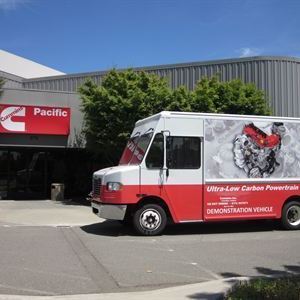Cummins gets 50-85% GHG reduction with new E85 optimized engine

Cummins Inc.
July 17, 2014
BY Susanne Retka Schill
Cummins Inc. announced the development of an E85 optimized engine and powertrain that reduces greenhouse gas emissions (GHG) by as much as 50 to 80 percent when compared with a baseline gasoline-powered medium-duty truck.
Using corn-derived E85, the high thermal efficiency and power-to-weight ratio of the Cummins prototype engine results in 50 to 58 percent lower well-to-wheels CO2 emissions compared with the gasoline engine baseline. Using second-generation lignocellulosic-derived E85, the powertrain's efficiency features deliver an impressive 75 to 80 percent lower well-to-wheels CO2 emissions, depending on the drive cycle.
More than 1,000 miles and 1,500 hours have been accumulated on the Cummins ETHOS 2.8L engine over the past two-and-a-half years, demonstrating the technology is capable of far exceeding the 50 percent CO2 emissions reductions outlined in the project's goals. A final on-road validation testing phase has been underway in the Sacramento, California, area since June and continuing into this month, and is being managed by Cummins Pacific, the exclusive California and Hawaii distributor for Cummins Inc. The work was jointly funded by Cummins in partnership with the California Energy Commission.
"The Cummins ETHOS engine, developed through a research partnership with CEC, clearly demonstrates that by combining innovative engine design and combustion approaches with low-carbon alternative fuels, we can determine a path to significant reductions in greenhouse gas emissions," said Wayne Eckerle, Cummins vice president of research and technology, in the Cummins’ announcement.
Advertisement
The Cummins ETHOS 2.8L is designed specifically to use E85. To take full advantage of the favorable combustion attributes and potential of E85, the engine operates at diesel-like cylinder pressures and incorporates advanced spark-ignition technology, the company announcement said. It delivers the power (up to 250 horsepower) and peak torque (up to 450 lb-ft) of gasoline and diesel engines nearly twice its 2.8-liter displacement.
The Cummins ETHOS 2.8L engine also incorporates an integrated stop-start system, which further reduces fuel consumption and emissions. In stop-start mode, the engine shuts down after the vehicle comes to a complete stop and the brake pedal remains depressed. As the driver's foot is lifted from the brake, the system automatically starts the engine to seamlessly allow acceleration from the stop.
Cummins-integrated specific system controls, along with a robust starter, smart alternator and sensors, are all designed to handle the additional stop-start duty cycle and maintain reliable operation over the life of the engine. Cummins also worked closely with Allison Transmission to integrate the 2000 Series transmission for smooth and efficient stop-start operation. The transmission is equipped with hydraulic circulation features to ensure smooth operation and quick vehicle launch during stop-start driving.
Advertisement
Additional partners in the project included Valvoline, which provided NextGen engine oils specifically designed for lower CO2 emissions, and Freightliner Custom Chassis, which provided a prototype MT45 Class 5 step-van vehicle.
Robert Falco, a retired professor of mechanical engineering from Michigan State University, told Ethanol Producer Magazine, that Cummins is making spectacular use of E85. “In the long run it will be a big competitor to diesel and ordinary gasoline engines, and will be a big boost to ethanol use.” The blend wall would become a thing of the past, he said, if engines actually got better horsepower, torque and mileage when optimized for higher ethanol blends. “It would be a no brainer. This development is showing the way—and by a major engine company.”
Falco, who now directs the Institute for Energy Resourcefulness, said the Cummins engine would be preferable to the CNG (compressed natural gas) retrofits becoming popular for fleet owners of delivery trucks. “The Cummins engine in a delivery truck should be less costly both to buy and in creating the fueling infrastructure than CNG, and thus could be more widely implemented. And, we are talking about a much greater CO2 reduction. The significant reduction in particulates and NOx will also be appreciated by all. With the imminent production of cellulosic ethanol from both agricultural wastes and municipal solid wastes, we will have an even more compelling reason to move in this direction. This engine could be the precursor of a family of 'ethanol optimized engines' that could also be used in pickup trucks and SUVs, and eventually in the family sedan, helping the auto companies meet the future CAFE standards, and greatly accelerating ethanol's adoption.”
Related Stories
CARB on June 27 announced amendments to the state’s LCFS regulations will take effect beginning on July 1. The amended regulations were approved by the agency in November 2024, but implementation was delayed due to regulatory clarity issues.
SAF Magazine and the Commercial Aviation Alternative Fuels Initiative announced the preliminary agenda for the North American SAF Conference and Expo, being held Sept. 22-24 at the Minneapolis Convention Center in Minneapolis, Minnesota.
Saipem has been awarded an EPC contract by Enilive for the expansion of the company’s biorefinery in Porto Marghera, near Venice. The project will boost total nameplate capacity and enable the production of SAF.
Global digital shipbuilder Incat Crowther announced on June 11 the company has been commissioned by Los Angeles operator Catalina Express to design a new low-emission, renewable diesel-powered passenger ferry.
International Air Transport Association has announced the release of the Sustainable Aviation Fuel (SAF) Matchmaker platform, to facilitate SAF procurement between airlines and SAF producers by matching requests for SAF supply with offers.
Upcoming Events










